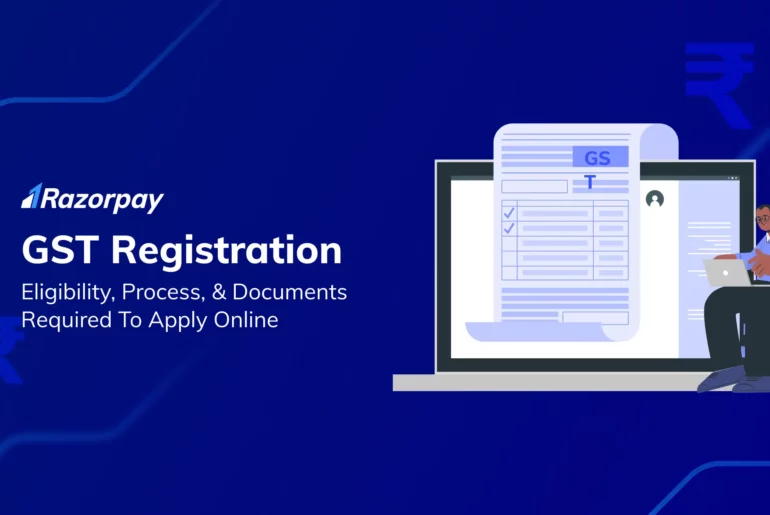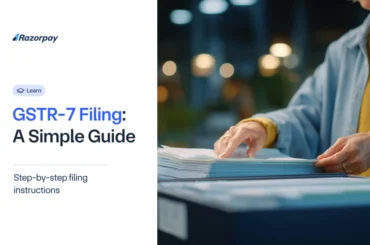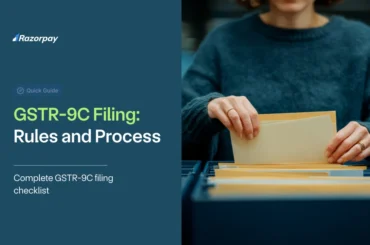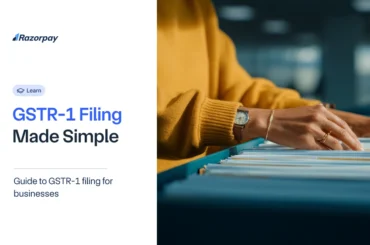Table of Contents
What is GST Registration?
GST registration is the process of obtaining a unique identification number for a business liable to pay Goods and Services Tax (GST). As per GST law, The firms with an annual turnover of more than Rs. 40 lakh (or Rs. 20 lakh for some special category states) must register as normal taxable entities.
For certain businesses, registration under GST is mandatory. If the organisation carries on business without registering under GST, it is an offence under GST and heavy penalties will apply. GST registration is usually completed within 6 working days.
GST registration is a process by which a taxpayer gets himself registered under GST. Once a business is successfully registered, a unique registration number is assigned to it known as the Goods and Services Tax Identification Number (GSTIN). You can also Verify GST number of any taxpayer to know the complete details.
Please note: If you are operating from more than one state, then you will have to take separate registration for each state you are operating from.
Related Read: Taxable Person Under GST – Who Qualifies As A Taxable Person?
What is Minimum GST Registration Turnover Limit?
The turnover limits for GST registration differ for normal and special category states. The following table summarises the turnover limits for different types of supplies and states:
Type of Supply |
Normal Category States |
Special Category States |
| Goods | Rs 40 lakhs | Rs 20 lakhs |
| Services | Rs 20 lakhs | Rs 10 lakhs |
| Both Goods and Services | Rs. 20 lakhs | Rs 10 lakhs |
The special category states under GST Rules
-
- Arunachal Pradesh
- Assam
- Jammu and Kashmir
- Ladakh
- Manipur
- Meghalaya
- Mizoram
- Nagaland
- Sikkim
- Tripura
- Uttarakhand
- Himachal Pradesh
Related Read: GST Registration Limits: Threshold limit for GST Registration for 2025
Who Should Obtain Registration Under GST?
- Casual taxable person / Input Service Distributor (ISD)
- Businesses with turnover above the threshold limit of Rs.40 lakh or Rs.20 lakh or Rs.10 lakh as the case may be
- Agents of a supplier & Input service distributor
- Non-resident taxable person
- Inter-state supplier of goods and services
- Supplier of goods through an e-commerce portal
- Any service provider
- e-commerce aggregator
- Liable to pay tax under the reverse charge mechanism
- TDS/TCS deductor
- Online data access or retrieval service provider
- Individuals who registered under Pre-GST law (i.e., VAT, Service Tax etc)
GST Registration Process
Below is the Procedure For Registration Under GST
One can apply for GST registration in Form REG-01 on the GST portal. The GST registration process involves seventeen steps. These steps include submitting various business details, scanned documents, and filling out form REG-01 on the GST portal.
Follow steps outlined in our articles “How to Get GSTIN Number?” or “How to Register for GST Online?“
Once you have completed the GST registration process, a GST officer will review your application and, upon approval, issues a GST registration certificate containing your GSTIN.
What are the Documents Required for GST Registration?
- Permanent Account Number (PAN) of the applicant
- Copy of the Aadhaar card
- Proof of business registration or incorporation certificate
- Identity and address proof of promoters/directors with a photograph
- Bank account statement/cancelled cheque
- Authorisation letter/board resolution for authorised signatory
- Digital signature
Read More: Documents Required for GST Registration
GST Registration Fees
As per GST law, no fees is required for obtaining GST registration through GST portal independently. That means you can register your business under GST for free without paying any charges to the government.
However, If any GST professional helps you with registration that will incur fees. If you’re comfortable using the GST portal and understand the required documents, you can register yourself (DIY).
Penalty for Not Obtaining GST Registration
Failing to register under GST can attract severe penalties and consequences.
Some penalties are:
-
A penalty of Rs. 10,000 or 10% of the tax due, whichever is higher, for not registering despite being liable to do so.
-
A penalty of Rs. 10,000 or the tax amount, whichever is higher, for collecting GST but not depositing it to the government within three months.
How to Check GST Registration Status?
After Applying for GST Registration you will receive an Application Reference Number (ARN). A GST registration application is processed after 15 days of submission. However, you can check the GST registration status online on the GST portal.
Related Read: Find GST Number Search By PAN
GST Registration FAQs
Who is eligible for GST Registration?
Under Goods And Services Tax (GST), businesses whose turnover exceeds the threshold limit of Rs.40 lakh or Rs.20 lakh or Rs.10 lakh based on the criteria, must register as a normal taxable person. It is called GST registration.
What is registration under GST act?
Registration of any business entity under the GST Law implies obtaining a unique number from the concerned tax authorities for the purpose of collecting tax on behalf of the government and to avail Input tax credit for the taxes on his inward supplies.
The registration under gst is compulsory whose turnover is?
Registration under GST is mandatory for all businesses whose annual turnover exceeds Rs 40 lakhs in a financial year. This threshold is Rs 20 lakhs for special category states such as Arunachal Pradesh, Assam, Meghalaya, Manipur, Mizoram, Nagaland, Sikkim, Tripura, Himachal Pradesh and Uttarakhand.
How many days for GST registration?
The complete GST registration procedure, including receiving the GST number, takes 7 to 10 working days.
Is GST Registration Mandatory?
Do I need to submit applications for multiple GST registrations?
Can I get multiple GST registrations within a state?
What is a GST identification number or GSTIN?
How long Should I wait to register under GST?
What happens after obtaining the GST registration?
How much is the fees for GST registration?
“No fee” is required for registering your business under GST.
Who is not eligible for GST registration?
- Small businesses with annual turnover below the specified threshold limit (currently ₹20 lakhs for most states, ₹10 lakhs for special category states).
- Employees providing services as part of their employment.
- Agriculturists supplying produce from cultivation.
- Entities dealing in exempt goods or services exclusively.
- Individuals supplying goods and services which are not liable to tax under GST.
How many days does it take for GST registration?
GST registration usually takes between 2-6 working days.
Can i file for cancellation of GST registration?
The registration, which is granted under GST, can be cancelled only for a few specified reasons. The cancellation can either be initiated by the department on their own or the registered person can apply for cancellation of their registration. In case of the death of a registered individual, the legal heirs can apply for cancellation.
Is GST filed every month?
The frequency of GST filing depends on the type of taxpayer and the type of return. For example, regular taxpayers with an annual turnover of more than Rs.5 crore must file two monthly returns (GSTR-1 and GSTR-3B) and one annual return (GSTR-9).
How long is a GST registration valid?
The GST registration for regular taxpayers has no expiry and is valid until it is surrendered or cancelled.
Is a bank account mandatory for GST registration?
Yes, a bank account is mandatory for GST registration. As per rule 10A of the CGST Rules, 2017, the newly registered taxpayer has to furnish the banking details within 45 days from the date of registration approval or the due date of filing the first return, whichever is earlier.
Can I modify my GST registration details?
Yes, you can modify your GST registration details through the GST portal by submitting an amendment application.
What is the difference between voluntary and mandatory GST registration?
Voluntary registration is when a business opts to register under GST, while mandatory registration is required by law based on turnover and business activity.
What happens if my GST registration application is rejected?
If your GST registration application is rejected, you will be notified with the reasons for rejection, and you can reapply after addressing the issues.





